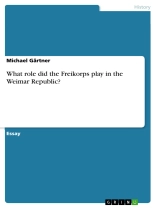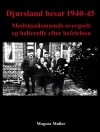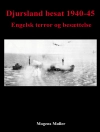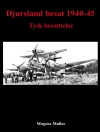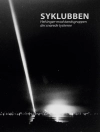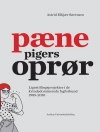Essay from the year 2003 in the subject History of Germany – World War I, Weimar Republic, grade: 62%, University of Wales, Aberystwyth (Department of History), language: English, abstract: In this essay I shall examine the role of the Freikorps in the Weimar Republic and show how they
changed from loyal government troops in 1918 – 1920, to reactionary forces by 1923. To some
historians, the Freikorps have no place in political history, but rather in military history. They seem
to ignore the fact that civil wars were sometimes more important than conventional wars. The
politically motivated soldiers of the 20th century conflicts were decisive from the Red Guards of the
October Revolution in Russia to the Vietminh of the 1950s and 1960s, and up to the Mujjahedin in
Afghanistan in the 1980s. The Freikorps fought and defeated the large threat from Communism,
minimised territorial losses on the borders and prevented national secession. The movement started
with honest aims, but once routine crept in and disappointment rose very high, the soldiers became
disillusioned by the government which they felt had “betrayed” them.
When we look at the Freikorps, we have to distinguish between the time up to their official
disbanding and the time afterwards, when they were just underground fighters with the ultimate aim
of crushing the Republic. The Freikorps can be split into three groups. The first group had generals
or wartime officers as their superiors; these were conservatives who had no enthusiasm for the
democratic republic, but in most cases they had moderate political views and disbanded their units
when the main dangers to the state had been warded of. Usually these units ended up in the
Reichswehr. The second group, which were the majority of the Freikorps, were local defence
groups, or units, which were formed and disbanded within weeks or months. But in these units,
there were many officers whose political views changed over the years. This will be the third
group. It is here that the most radical leaders can be found. They and their soldiers could not accept
that Germany had been defeated on the front line – they detested the left wing parties for the “stab
in back”1 and hated the government who signed the Armistice. […]
1 Field Marshall v. Hindenburg, when asked why Germany lost the war, brought up this legend.
Michael Gärtner
What role did the Freikorps play in the Weimar Republic? [EPUB ebook]
What role did the Freikorps play in the Weimar Republic? [EPUB ebook]
Compre este e-book e ganhe mais 1 GRÁTIS!
Língua Inglês ● Formato EPUB ● Páginas 31 ● ISBN 9783638194990 ● Tamanho do arquivo 0.1 MB ● Editora GRIN Verlag ● Cidade München ● País DE ● Publicado 2003 ● Edição 1 ● Carregável 24 meses ● Moeda EUR ● ID 3651003 ● Proteção contra cópia sem
